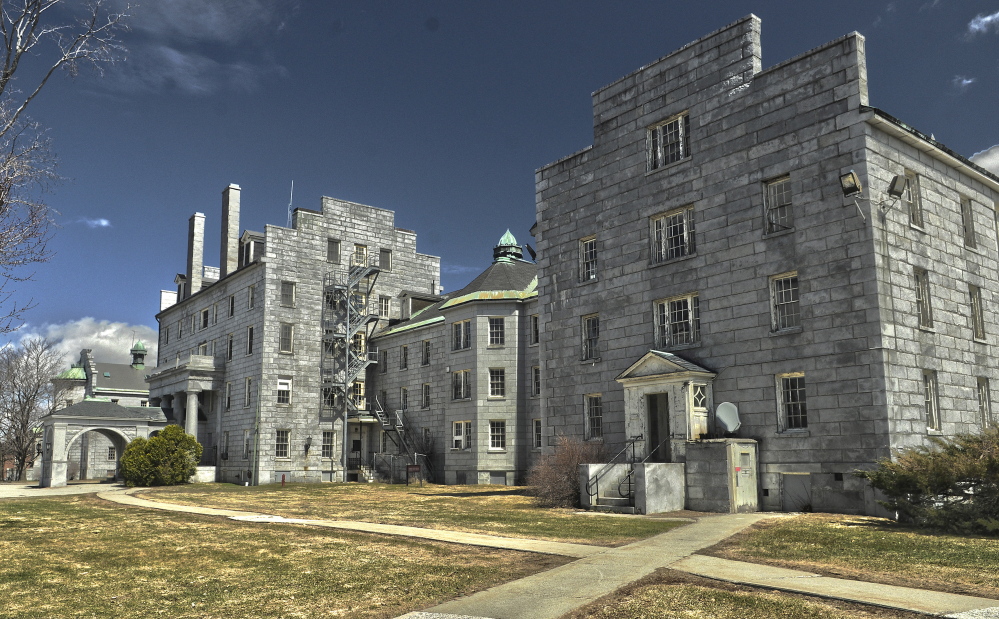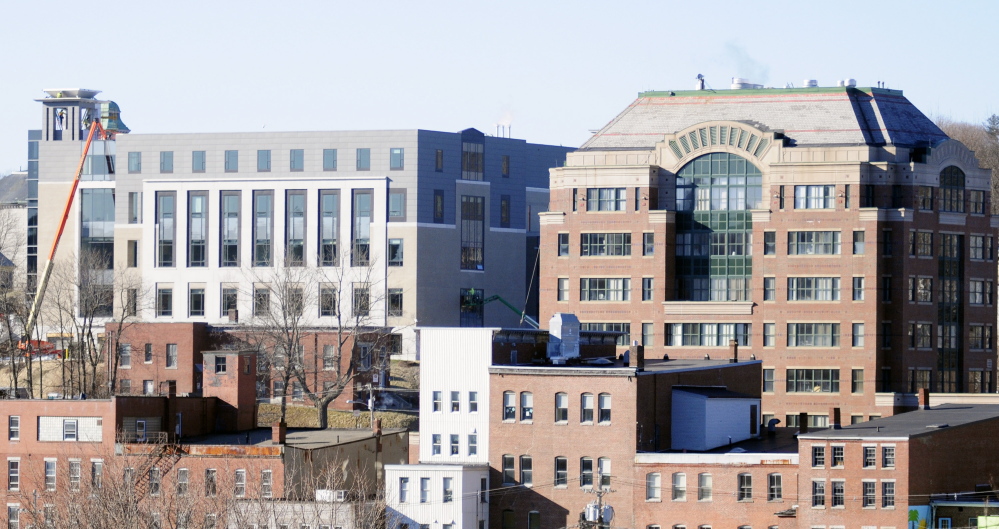AUGUSTA — Some of the city’s largest and most prominent buildings would be left nearly vacant under a state proposal to borrow $112 million to move state workers from leased space to renovated or yet-to-be-built state-owned property.
City officials and the owners of more than 200,000 square feet of private office space leased to the state say the proposal, deep in Gov. Paul LePage’s proposed state budget, would be devastating to the capital city.
They also say it could also cost money in the long run.
State officials, meanwhile, say the proposal to borrow money to create more state-owned office space and move workers into it as leases expire, could save $46.4 million over 35 years, according to an initial state analysis.
A one-paragraph proposal tucked deep into LePage’s budget would authorize the Maine Governmental Facilities Authority to issue $112 million in bonds for capital repairs and improvements to state property.
That benign-seeming language in the 121-page budget, said city officials and state Sen. Roger Katz, R-Augusta, is part of a larger proposal to move state offices and storage space now leased in some of the largest income-producing commercial buildings in Augusta into state-owned office space.
On the list are 317,000-square-foot Central Maine Commerce Center in north Augusta, 76,510 square-foot Key Plaza building in downtown Augusta, and 2, 35 and 41 Anthony Ave. in the Augusta Business Park in north Augusta.
City Manager William Bridgeo said state-leased space in all the property listed totals 362,204 square feet and brings in, or from the state’s perspective costs, $4.4 million a year in lease fees. He said the property value amounts to about 5 percent of Augusta’s total property value. The analysis that goes with the state’s proposal appears to have been based on the lease cost for 271,000 square feet versus the cost of owning and maintaining 170,000 square feet of space.
Some of the new state space would be built, and other space would be renovated, Katz said.
He said the buildings to be renovated would likely be on the old Augusta Mental Health Institute campus on Augusta’s east side.
The Department of Health and Human Services occupies the three Anthony Avenue sites, and he said that move would be part of a plan to consolidate the department into one new building, presumably to be built in Augusta.
COST TO THE CITY
The proposal could leave roughly 70 percent of the Central Maine Commerce Center, and all but the bottom floor of the downtown Key Plaza building vacant, according to preliminary information provided to Katz by the state Department of Administrative and Financial Services.
Bridgeo said the proposal could cost the city “well in excess of $1 million a year,” in reduced property taxes from the commercial buildings now leased out to the state by building owners. Bridgeo said much of the taxable value of commercial buildings is based upon how much income they produce. So if the building owners get less lease income, the city would get less property tax income.
“This is a significant issue for the city of Augusta and something we have to get on,” Bridgeo said. “We’re going to pursue it, vigorously.”
Kevin Mattson, a partner in the Central Maine Commerce Center, said about 70 percent of the sprawling former computer plant in north Augusta converted years ago to mostly office space is occupied by state offices, including 43,100 square feet of space used by the state Department of Public Safety on an annual lease of $520,000, which expires in 2019.
While it isn’t if all the state workers there would move out under the proposal, he said the overall impact of state workers moving from leased property-tax paying property to state-owned, non-property tax paying property would be devastating to the city and leave building owners like him with a bunch of vacant space all at once.
“Augusta’s business is government,” Mattson said, noting most demand for commercial space in the city is for state offices and space for other state government operations. “Who else would fill (the vacant space)? What are the private businesses that are growing? You take government out and you’ve got some big vacancies for a long time. It’d be pretty bleak.”
The state’s Key Bank building lease is up in 2018, 25 Anthony Ave. is up in 2016 and 2 and 41 Anthony Ave. are up in 2023.
‘BAD DEAL FOR THE STATE’
Mattson and city officials said it’s not the financial woes the proposal would bring to commercial building owners, or even the substantial lost revenue it would cost the city that will form the basis of their fight against it.
Instead, they plan to make their case the proposal would be a bad deal for the state, and cost more public money than leasing space.
Katz said that he’s “confident once the facts are on the table, we can show leasing space from the private sector is a real bargain for state taxpayers, versus the full cost of the state constructing and operating its own buildings in the area.”
“We need to make sure we’re comparing apples to apples and all costs are included,” he said.
He said costs such as ongoing maintenance and capital improvements must be factored in to any savings analysis.
An analysis, provided to Katz by state Department of Administrative and Financial Services Commissioner Richard Rosen, shows the state would save $46.4 million over 35 years by moving out of privately owned leased space.
Rosen could not be reached for comment about the state’s plans Friday.
While the analysis includes debt and operating costs, it makes no mention of costs of depreciation, replacement cost for the buildings, nor capital improvement projects, such as roof replacement or other major repairs.
Mattson said capital costs can escalate quickly, and nearly all major systems in a large building are bound to need replacement at some point.
“You need to look at the all-in costs,” he said. “Roofs, air conditioning systems, things like that, currently (while leasing space) if the state has any issues with those items, if the roof leaks or whatever, the landlord just has to fix it and you don’t get any extra money for it. Every single system inside that building will need to be replaced, in 35 years, at least once. And that stuff is very expensive.”
Mattson, an experienced developer of commercial property, said his firms’ previous research has shown the private sector can provide office space for less per square foot, than government, even while paying property taxes.
“It’s always less money for private business to deliver this service,” he said. “A hyper-competitive bid process results in lower rates. There is a reason the state doesn’t own an oil company, even though it is a huge oil user. It’s always better to outsource these to people who do this for a living. And this is what we do.”
City officials plan to hire their own expert to calculate what they believe to be the true costs of the state switching from leased to owned office space in Augusta.
“There is more to looking at cost-benefit than the state’s analysis,” Bridgeo said. “We believe if you do the analysis and include all costs, as any logical accounting practice would do, it’s a better deal to lease the space. We intend to try to prove that.”
CITY REACTION
At-Large City Councilor Jeffrey Bilodeau questioned how much the city will spend on the potential battle. He said the building owners have more at stake than the city, so they should be the ones to spend their own money to look out for their own interests.
Bridgeo said the work they commissioned from an expert to analyze the costs of the state renting versus owning will cost around $2,000 to $3,000, which would come from the city’s economic and community development budget. He said the city has to try to protect its tax base, just as it seeks to expand it by attracting new businesses.
Mayor David Rollins said the city could be reimbursed, or work in a partnership, with building owners in making their case against the proposal.
Ward 3 City Councilor Patrick Paradis criticized the proposal because, as a bond through the Maine Governmental Facilities Authority, it would not require voter approval. And, as part of the governor’s budget, not a standalone bill, it isn’t scheduled for a public hearing.
“This is leaving debt for the next governors, the next legislatures, and taxpayers to have to pay off for the next 40 years,” he said. “All we know is it is in the governor’s budget, and there may not even be a public hearing on that part.”
Katz said the Appropriations Committee, of which he is a member, will eventually review the proposal as part of their review of the entire, more than $6 billion two year state budget proposal. He said most bond proposals come to the Legislature as standalone bills.
He said the issue would likely be decided within the Appropriations Committee and if it looks like there is any significant support on the committee for keeping the proposal in the budget, the committee would hold a public hearing.
“My colleagues in the Augusta delegation and I will certainly do everything we can to convince my colleagues on the Appropriations Committee any proposal of this magnitude needs a great deal more study before we adopt it,” Katz said. “If we’re going to invest $112 million in public money, I’m confident we can find more worthwhile investments than this one.”
Keith Edwards — 621-5647
kedwards@centralmaine.com
Twitter: @kedwardskj
Send questions/comments to the editors.






Comments are no longer available on this story